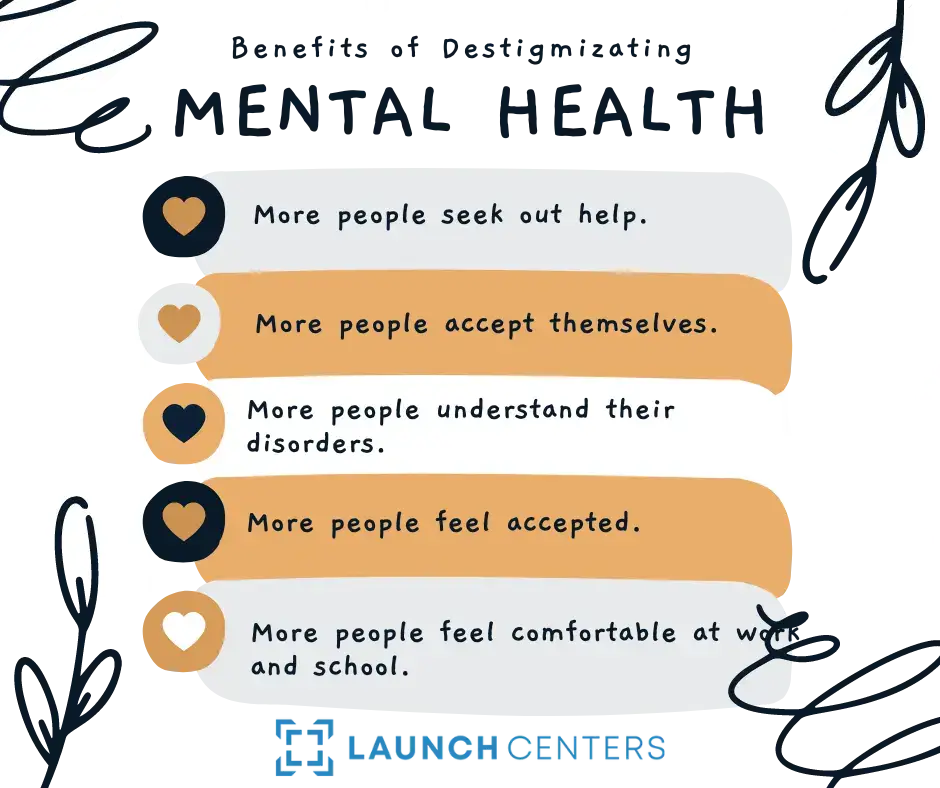While there are more and more pushes to increase mental health treatment and awareness, thousands of individuals are still afraid of seeking care or associate treatment as “weak” or “cowardly.” Launch Centers and other mental health treatment programs are dedicated to challenging and flipping that belief.
This article will explore the benefits of destigmatizing mental health treatment, the most common challenges, and the actions you can take to be a part of this needed movement.

Why Is There A Stigma Toward Mental Health Treatment?
Despite the increasing acceptance of mental health, a significant stigma exists surrounding mental health treatment. Mainstream society can often portray mental health treatment as a taboo subject, making it challenging for individuals to speak up and seek help.
The portrayal of mental health in media is often negative, with individuals struggling with mental health issues being shown as dangerous, incompetent, irrational, or untrustworthy. This also contributes to individuals with substance use disorders and their representation in media as criminals, delinquents, and juveniles.

Is There A Mental Health Generation Gap?
Older generations may perceive younger generation individuals with mental health issues as “complainers” or “spoiled,” disregarding their problems as trivial. Younger generations are considered “soft” or “overly sensitive” compared to older generations who have experienced different challenges, viewing mental health struggles as a sign of weakness and believing that people should “toughen up” and push through their struggles.
As professionals explore mental health problems, they discover that these older generations may actually have mental health disorders themselves. The CDC reported that 20% of people age 55 years or older have an undiagnosed condition, the most common including anxiety, depression, and bipolar disorder.
How To Address The Mental Health Generation Gap
While younger generations may feel more at ease seeking mental health assistance online, this approach may not result in receiving a professional diagnosis. A study by American University in DC suggests that millennials, who were exposed to discussions about anxiety, depression, eating disorders, and suicide during their upbringing, tend to be more accepting of individuals with mental illness.
Mental illness is not a choice and should not be hidden. In the past, cliché religious and cultural remedies were passed down through generations to deal with periods of distress. Still, they are no longer effective as we learn more about mental health disorders and have easily accessible scientific knowledge. The gap between generations is not just a difference in age but also in information and outdated solutions that need to be unlearned to better understand mental health.
The Most Common Mental Health Challenges
There are two main challenges or cognitive distortions individuals may believe before they consider mental health treatment.
“Mental health disorders are not normal.”
Take the time to remind yourself and others that it’s okay to struggle with mental health issues and to seek help. Unfortunately, mental illness and therapy have always been looked down upon, causing individuals to ignore or repress their emotional pain. However, suppressing symptoms of mental illness does not make them disappear; instead, they can worsen and impact an individual’s entire quality of life.
“No one else feels the way you do.”
You are not alone in the way you feel. Everyone faces struggles at some point in life, and it’s estimated that around 40.2 million adults in 2019 sought mental health treatment or counseling. However, the lack of discussion surrounding mental health makes it easy to feel isolated and alone. This harmful mentality can breed feelings of hopelessness and despair. The belief that you’re alone and need to deal with mental health issues on your own is a cognitive distortion. But, by setting an example and speaking about your challenges, you can help others express themselves and feel cared for.

5 Benefits of Destigmatizing Mental Health Treatment
Here are the top five benefits of destigmatizing mental health treatment.
- More people seek out care: When something becomes less taboo, people feel more comfortable sharing their personal experiences. When the stigma surrounding mental health is reduced, more people will likely seek the help they need and feel cared for by their friends, doctors, and families. As more people seek care, scientists and experts can gain more insight into disorders like ADHD, bipolar disorder, and other stigmatized mental health conditions.
- More people accept their mental health conditions: When the stigma surrounding mental health is reduced, more people may be willing to accept their conditions and seek out the help they need. This also helps people cast less judgment on others they perceive as incapable of dealing with issues they themselves may have or shrug off.
- More people understand and can work on their mental health: Reducing the stigma surrounding mental health can help people understand their conditions and how to manage them. This includes learning about symptoms, coping skills, and treatment options. Every mental health disorder has unique treatment methods, and by understanding them, you can find the right solutions.
- Increased support and understanding from friends and family: By reducing stigma, more people may feel comfortable talking about their mental health with their family members or loved ones, which can help to build stronger relationships and provide much-needed emotional support.
- Improved workplace and school environments: When mental health is prioritized, employers and educators may be more likely to implement policies and programs that support mental health. This could include things like offering mental health days off or providing mental health resources and support services to employees and students.

How You Can Destigmatize Mental Health
Mental illness is often invisible, and many suffering from it hide their pain behind a smile. By speaking openly about your struggles, you give a voice to mental illness and humanize it, making it easier for others to understand and empathize.
Whether it’s through social media or daily conversations, sharing your journey with mental health and counseling can make a profound impact. It’s important to remember that seeking help is a sign of strength, and by seeking support, you can improve your life and well-being, along with the lives of others. Here are a few other ways you can reduce mental health stigma.
- Volunteering with mental health organizations such as the National Alliance on Mental Illness (NAMI) or finding something near you.
- Sharing mental health resources and information on social media or in your community can help raise awareness and reduce stigma.
- Attending mental health events and conferences can be a great way to learn more about mental health and connect with others who share similar experiences.
- Consider forming a mental health support group in your community or school to bring people together and show them they are not alone.
- Fundraising for mental health organizations can help support research, education, and advocacy efforts.
- Participating in mental health advocacy efforts and lobbying for improved mental health policies can help improve access to care and reduce stigma on a national level.
Destigmatizing Mental Health Treatment At Launch Centers
Launch Centers in Los Angeles is dedicated to reducing mental health stigma and helping young adults find the mental health care they need to overcome debilitating issues. Many of our clients are overcoming anxiety disorders, depression, ADHD, and substance abuse. If you decide to find treatment with us, you’ll be comforted by empathic individuals and mental health professionals who care about your goals and needs. Contact us today to learn more and find out how Launch Centers is different.





